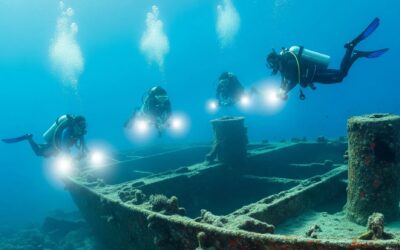It’s one of those days…Everything just seems to be perfect, and then, suddenly, there is an accident at the dive site. It’s time to act. Who is responsible for what and what needs to be done?
This are common questions divers and professional ask themselves in such a moment. As part of the Rescue Diver and Divemaster course students need to create an emergency assistance plan. Generally, this task should be pretty easy, especially thanks to the internet. However, often students are not sure which information they should include in their plan and which not.
What is the purpose?
The purpose of having an emergency assistance plan is simply to inform a bystander in case of emergency what needs to be done. It is a prerequisite for Any involved person should be able to contact emergency services and guide them to the exact location of the accident. Therefore, an emergency assistence plan should be kept briefly and not include too many details. When an emergency occurs, time is limited and people need to act quick, there is no time for confusions or long explanations.
What should be in it?
Obviosly there are some key components that should be in any emergency assitance plan, whereas other information are optional or depending on the circumstances of the dive site and logistics. Simply ask yourself what you would do first. Probably it would be best, to contact emergency services, police if needed and the dive center first. When diving from a boat for example, it is very important to have information about VHF channels and emergency calls, aswell as the closest port. When diving from shore instead, the exact adress of the location might be useful and how or from where an ambulance could access the site for evacuation. It might be great to include a map with directions to explain access and to make a bystander understand where he or she is at this moment. It would be great to know where about the closest hospital and decompression chamber is.
Very important is also the location of nearby emergency equipment. Where is the emergency oxygen kit, the first aid kit and maybe even a defribrilator located? Often it might take quite some time until EMS will arrive. Being able to administer oxygen to the victim as early as possible might save a life. It might be of great help for the arriving emergency personnel to receive information about the victim incl. the dive profile. When diving with a dive center, it is most likely that you have the personal paperwork of the victim with the most important information, insurance number and medical questionnaire. If any pre-existing medical conditions, you should inform EMS.
As you can see, the content can vary depending if you should design a general emergency plan or focus on a certain dive site. As following you will find, as we believe, the most important components of an emergency assistance plan.
| Contact information for emergency services Hospitals EMS Dive insurance Police / Guardia Civil |
| Contact information dive centre Adress Phone numbers Managers |
| Evacuation/ location of dive site Adress Entry points for EMS Next port to meet emergency medical service & evacuation personnel |
| VHF radio frequencies Hospital VHF Channel Coastguard VHF Channel Lifeguard VHF Channel Worldwide Emergency VHF Channel Explain to the operator that you have a scuba diving emergency. Explain where exactly you are and how long it takes you to the next port/ bay where EMS can meet you. Describe to the operator what happened and if you are providing care (emergency oxygen, first aid etc.). |
| Emergency calls VHF 1. 2. 3. |
| Nearest recompression chamber adress/ phonenumber |
| Emergency equipment at dive site/ on land/ on boat First aid kit and emergency oxygen Life jackets, life ring Mobile phone, radio |
| Personal emergency contact information Diver’s name: Emergency contact: Adress: Phone: |
| Relevant medical information Allergies: Medications: Conditions: Medical insurance information and Policy number: DAN member number: Additional relevant medical information: |
| Diving emergency information Diver’s name: Vital signs: Pulse: Blood pressure: Symptoms and Signs: Allergies: Medications: Medical history: Last meal: Events leading to the current situation: Neurological assesment: Dive profile information: |
Do you miss anything important? Is there anything critical we left out that should be in an emergency assistance plan? Send us an email to [email protected] with your thoughts.



